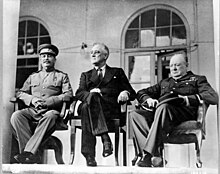
Back رجال الشرطة الأربعة Arabic Чатыры паліцыянты Byelorussian Четирима полицаи Bulgarian Cuatro Policías Spanish چهار پاسبان Persian Quatre gendarmes French Empat Polisi ID Quattro poliziotti Italian 四人の警察官構想 Japanese 4명의 경찰관 Korean


The "Four Policemen" was a postwar council with the Big Four that US President Franklin Roosevelt proposed as a guarantor of world peace. Their members were called the Four Powers during World War II and were the four major Allies of World War II: the United Kingdom, the United States, the Soviet Union, and China. Roosevelt repeatedly used the term "Four Policemen" starting in 1942.[1]
The Four Policemen would be responsible for keeping order within their spheres of influence: Britain in its empire and Western Europe, the Soviet Union in Eastern Europe and the central Eurasian landmass, China in East Asia and the Western Pacific; and the United States in the Western Hemisphere. As a preventive measure against new wars, countries other than the Four Policemen were to be disarmed. Only the Four Policemen would be allowed to possess any weapons more powerful than a rifle.[2]
Initially, Roosevelt envisioned the new postwar international organization would be formed several years after the war. Later, he came to view creating the United Nations as the most important goal for the entire war effort.[3] His vision for the organization consisted of three branches: an executive branch with the Big Four, an enforcement branch composed of the same four great powers acting as the Four Policemen or Four Sheriffs, and an international assembly representing other nations.[4]
As a compromise with internationalist critics, the Big Four nations became the permanent members of the UN Security Council, with significantly less power than had been envisioned in the Four Policemen proposal.[5] When the United Nations was officially established later in 1945, France was in due course added as the fifth permanent member of the Security Council[6] because of the insistence of Churchill.
- ^ Richard W. Van Alstyne, "The United States and Russia in World War II: Part I" Current History 19#111 (1950), pp. 257-260 online
- ^ Gaddis 1972, p. 25.
- ^ For Roosevelt, "establishing the United nations organization was the overarching strategic goal, the absolute first priority." Townsend Hoopes; Douglas Brinkley (1997). FDR and the Creation of the U.N. Yale UP. p. 178. ISBN 0300085532.
- ^ Hoopes & Brinkley 1997, p. 100.
- ^ Gaddis 1972, p. 27.
- ^ 1946-47 Part 1: The United Nations. Section 1: Origin and Evolution.Chapter E: The Dumbarton Oaks Conversations. The Yearbook of the United Nations. United Nations. p. 6. Retrieved 18 February 2018.
© MMXXIII Rich X Search. We shall prevail. All rights reserved. Rich X Search